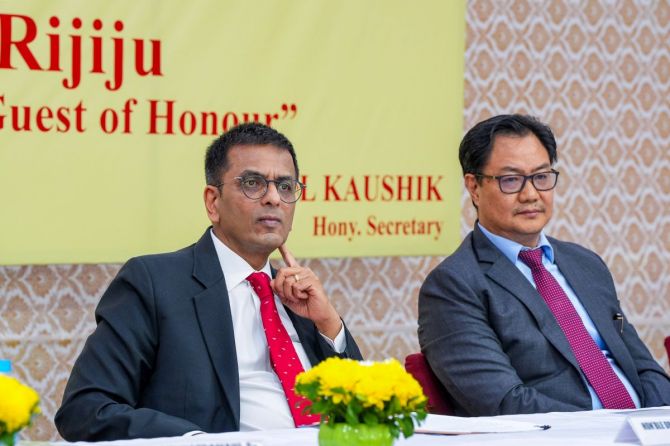Law Minister Kiren Rijiju on Saturday claimed that a few retired judges and some activists who are 'part of the anti-India gang' are trying to make the Indian judiciary play the role of the opposition party.

He again criticised the collegium system to appoint judges, saying it is a result of the 'misadventure' of the Congress party.
The minister was speaking at the India Today Conclave, where Chief Justice of India Justice D Y Chandrachud later defended the Collegium system, saying 'not every system is perfect but this is the best system we have developed' and the 'object was to protect the independence of the judiciary, which is a cardinal value'.
The minister said at a recent seminar in Delhi, where some retired Supreme Court judges and some senior lawyers were present, the topic was accountability in judges' appointment.
"But the discussion the whole day was how the government is taking over the judiciary," he said.
The minister said he shares an excellent relationship with the chief justice of India, the present one, the last one and all the judges of the Supreme Court.
"It is a few of the retired judges -- maybe three or four -- a few of those activists, part of the anti-India gang - these people are trying to make Indian judiciary play the role of the opposition party.
"Some people also go to the court and say please rein in the government, please change the policy of the government . These people want the judiciary to play the role of the opposition party, which cannot happen," Rijiju said.
The judiciary, he asserted, is neutral.
"Judges are not part of any group or political affiliation. How can these people openly say that the Indian judiciary must take head-on with the government. What kind of propaganda is this," he wondered.
On the issue of the appointment of judges, Rijiju said there is no role of the judiciary as such to initiate and to give finalisation to the appointment of judges.
"It was only later due to the misadventure of the Congress party, the Supreme Court started acting, which some people describe as judicial overreach. Then the collegium system came into existence."
But right now, the position of the government is very clear that the collegium system is in place.
"As long as a new system is not introduced, we will follow the collegium system but the appointment of judges cannot be done by a judicial order. It is purely administrative," he said.
Rijiju has been quite vocal against the Collegium system and once even called it 'alien to our Constitution'.
Speaking at the conclave later, CJI Justice Chandrachud said judiciary has to be protected from outside influences if it has to be independent.
"Not every system is perfect but this is the best system we have developed. But the object was to protect the independence of the judiciary, which is a cardinal value. We have to insulate the judiciary from outside influences if the judiciary has to be independent," Justice Chandrachud said.
The CJI also responded to Rijiju's voicing displeasure over the Supreme Court Collegium revealing the government's reasons for not approving the names recommended by it for appointment as judges of constitutional courts.
"What is wrong about having a difference in perception? But, I have to deal with such differences with a sense of robust constitutional statesmanship. I do not want to join issues with the law minister, we are bound to have differences of perceptions," the CJI said.
Justice Chandrachud said there is absolutely no pressure from the government on how to decide cases.
"In my 23 years of being a judge, no one has told me how to decide a case. There is absolutely no pressure from the government. The Election Commission judgment is proof that there is no pressure on the judiciary," CJI said.
The Supreme Court had recently ruled the appointment of the Chief Election Commissioner and election commissioners will be done by the President on the advise of a committee comprising the prime minister, Leader of Opposition in the Lok Sabha and the Chief Justice of India.